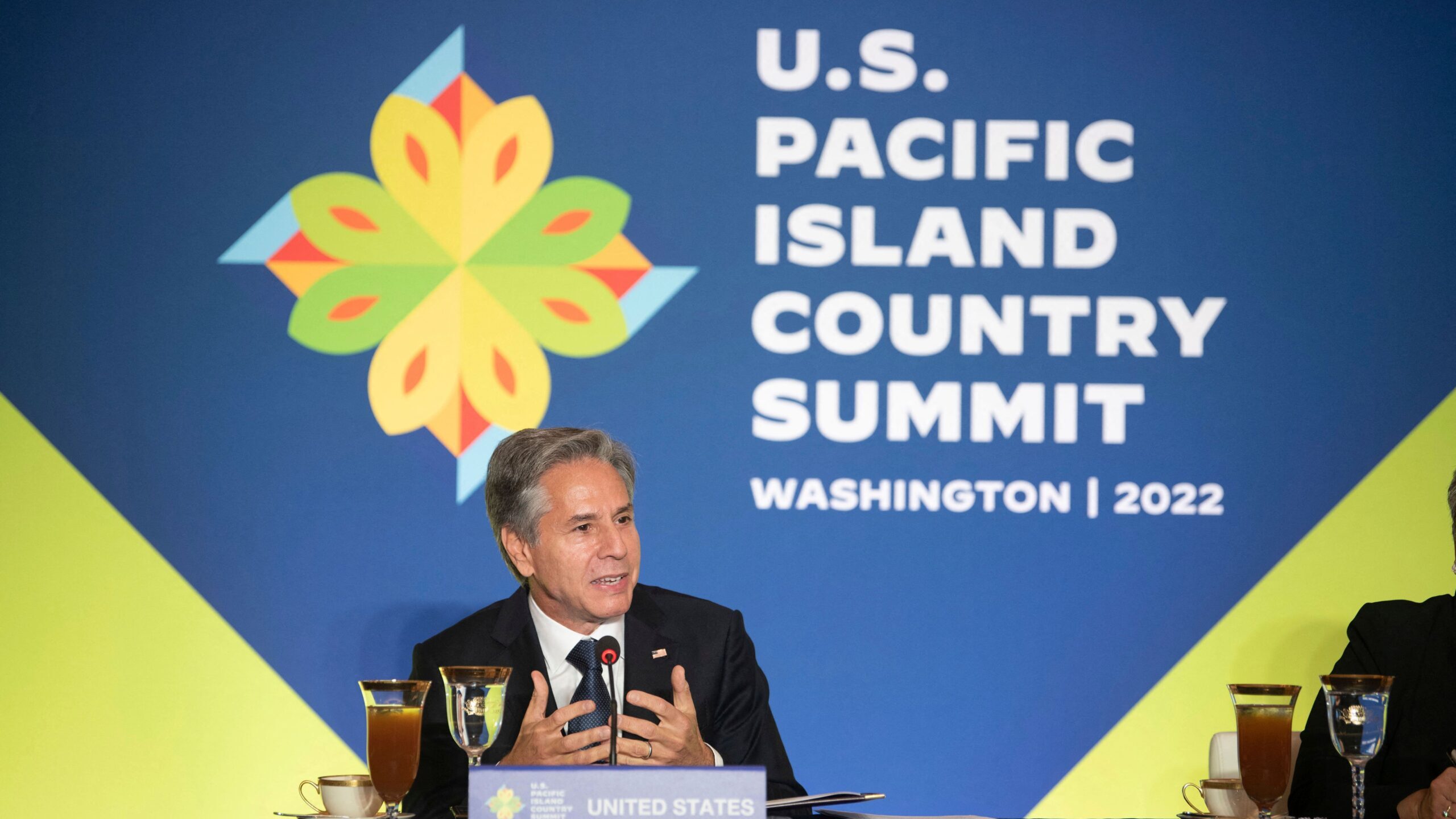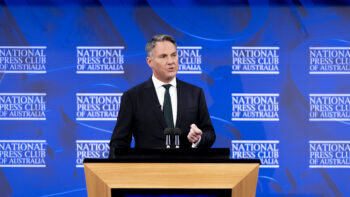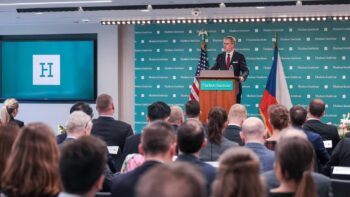
US Secretary of State Antony Blinken hosts a working lunch with Pacific Island Countries on the margins of the US-Pacific Island Country Summit in Washington, DC, September 28, 2022. (Photo by KEVIN WOLF/POOL/AFP via Getty Images)
SYDNEY — In its most high-profile effort yet to woo Pacific island nations away from the pull of Beijing, the US treated island leaders to red carpet treatment at the White House — including a dinner with President Joe Biden — and they will be on the receiving end of some $810 million in funding as part of a newly announced “Pacific Partnership Strategy.”
The largest pledge to any one country is going to the Solomon Islands, which had been reticent to agree to the proposed plan for the Pacific, according to several news reports. The Solomons, in particular, became a flashpoint for the concern over Beijing’s Pacific strategy after it was revealed those two nations had signed a secret security pact. The new US funding to the Solomons is in the form of a grant program worth $20 million “to spur tourism investments and jobs in the Solomon Islands.”
Much of the rest of the money announced today appears to be a $600 million program spread over 10 years that the administration first announced in July. Most of it will be associated, a White House Fact Sheet released today says, with the South Pacific Tuna Treaty.
Fourteen Pacific nations sent leaders to Washington, with representatives from Nauru and Vanuatu. New Zealand, Australia and the Pacific Islands Forum are observers. The high profile summit, which includes a dinner at the White House with Biden, was kicked off by Secretary of State Anthony Blinken on Wednesday, who made a bold promise: “You can count on the United States partnering with you.” You can be sure the leaders involved will watch America closely after more than 20 years of being largely ignored.
The new “Pacific Partnership Strategy” released by the White House points at “pressure and economic coercion by the People’s Republic of China, which risks undermining the peace, prosperity, and security of the region, and by extension, of the United States” as a key factor driving American policy in the region.
“These challenges demand renewed U.S. engagement across the full Pacific Islands region. To that end, President Biden is elevating broader and deeper engagement with the Pacific Islands as a priority of U.S. foreign policy. This national strategy – the first-ever from the U.S. government dedicated to the Pacific Islands – both reflects and advances that commitment,” it says.
It also makes clear how important climate change is to the Pacific islands, who believe they face an existential threat from the increasingly severe storms and the rising sea levels in the region.
“In this decisive decade, we will draw ourselves closer to the Pacific Islands, individually and regionally; coordinate more efficiently with our allies and partners; and create opportunities and work together to address threats to the region—the climate crisis most of all,” the strategy says.
The document states the basic American approach to the Pacific islands this way:
“The foundation of our engagement in the Pacific Islands must be strong ties between the United States and the Pacific Islands, individually and collectively. We recognize that, as a committed partner to the Pacific, we must enhance our enduring relationships, especially with the Republic of Palau, the Republic of the Marshall Islands, and the Federated States of Micronesia, with which we have Compacts of Free Association. Doing so requires a substantial increase in the overall U.S. diplomatic presence and engagement in the region through new embassies, additional personnel from across the U.S. government, and enhanced U.S. Coast Guard and defense engagements.”
Since money is a key expression of strategy the United States noted it “has directly provided over $1.5 billion to support the Pacific Islands over the past decade and today has announced over $810 million in additional expanded programs.”
On top of that, the US committed to recognize Cook Islands, a group of 15 small islands whose residents are all citizens of New Zealand, and Niue, a coral island with about 1,600 residents, who are also citizens of New Zealand. The strategy reiterated the US commitment to reopen an embassy in the Solomon Islands, and begin discussions with Kiribati and Tonga about developing embassies there. That would expand the number of Pacific Island embassies from six to nine. “Where gaps in permanent presence remain, we will pursue additional facilities and creative solutions to provide the Pacific Islands with the diplomatic attention they deserve,” the strategy declares.
The US will also appoint Frankie Reed, former ambassador to Fiji, Kiribati, Tonga, Nauru and Tonga as, effectively, the point person for the Pacific islands. She will be the first envoy to the Pacific Islands Forum. And the new group, “Partners in the Blue Pacific” — the United States, Australia, Japan, New Zealand and the United Kingdom — will be joined by Canada and Germany.
The Fact Sheet also outlines these commitments:
- Maritime Security and Marine Protection: The State Department is partnering with the U.S. Coast Guard to provide over $3 million to enhance U.S. Coast Guard training and capacity-building in the Pacific Islands for maritime security and marine protection.
- Law-Enforcement Training: The State Department is partnering with the Federal Bureau of Investigation (FBI) to provide $2.8 million for FBI-led law enforcement training to Pacific Island countries. Launched to enhance the capacity of the law-enforcement community in the Federated States of Micronesia, the Republic of the Marshall Islands, and Palau, this program will expand in 2022 to include Papua New Guinea, Vanuatu, and Solomon Islands.
- Bilateral Security Negotiations: The United States is currently engaged in bilateral security negotiations with Fiji for a new Acquisition and Cross-Servicing Agreement (ACSA) and will soon begin negotiations with Papua New Guinea on a Defense Cooperation Agreement (DCA). The United States will pursue other opportunities to negotiate agreements that support Pacific objectives to respond to humanitarian disasters and protect their maritime domains.
- Global Defense Reform Program: The State Department will deliver $2 million in new assistance to improve security-sector governance and institutional capacity of select U.S. partners through advisory support efforts.
Also, the US will spend several million dollars “to support the digital transformation of Pacific Islands countries.”






















